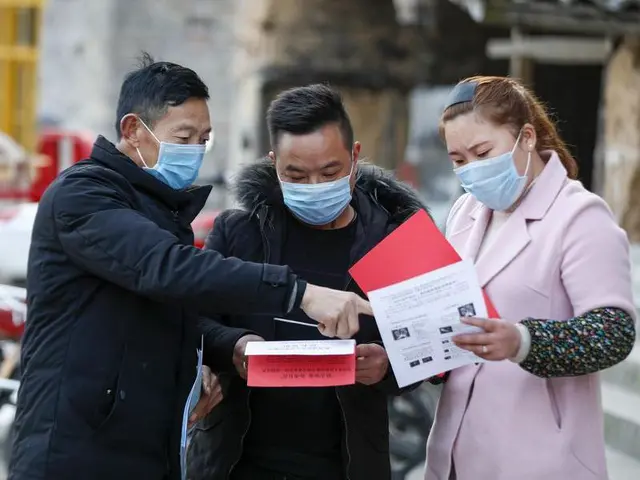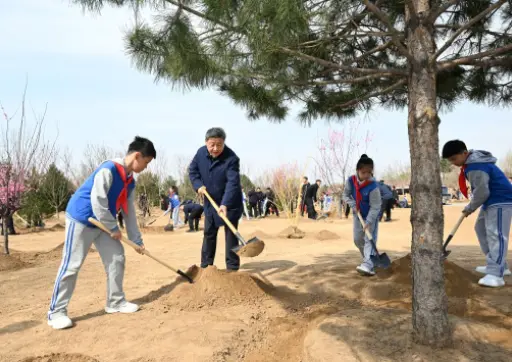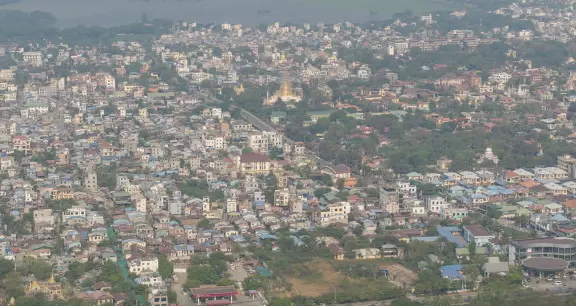A staff member (1st L) distributes publicity materials about prevention and control measures to curb the spread of the novel coronavirus at Huatai Township in Wuxi County, southwest China's Chongqing, Jan. 28, 2020. (Xinhua/Huang Wei)
China's grassroots groups, from urban communities to remote villages, are on the move to fight the novel coronavirus. The following are local snapshots of the grassroots mobilization, which has involved millions of volunteers, community workers and people from all walks of life.
BEIJING, Feb. 1 (Xinhua) -- "Don't go party! The virus's belly is empty!" On Tik Tok, a blogger turned virus control tips into rap-style doggerel, then chanted them in the Fuzhou dialect.
On Saturday afternoon, the verses were broadcast dozens of times in an old neighborhood in Fuzhou, capital of Fujian Province, as community workers used a loudspeaker to get the message across.
As China ramps up the fight against the novel coronavirus, grassroots groups, from urban communities to remote villages, are on the move.
They translated official jargon and legalese into streetwise lexicon, flew drones to broadcast instructions and sent workers to buy vegetables for quarantined residents in a nationwide campaign to curb the transmission of the virus.
The following are local snapshots of the grassroots mobilization, which has involved millions of volunteers, community workers and people from all walks of life.
DEITIES, SNACKS, ALL WEAR MASKS!
Cyberspace has become a major front in the publicity campaign as many Chinese follow the official instructions to stay at home, spending more time surfing the Internet.
Many netizens have joined the campaign, using music, short videos and cartoons to popularize knowledge on epidemic prevention control.
In one caricature, legendary figures from the literary classic "Journey to the West" wear masks and rest in a circle in a simulation of the real-life quarantine. Though in the novel, the magic circle is drawn to fend off demons.
"It is my way of raising public awareness of the epidemic and helping them understand the quarantine measures," said Bi Lige, a cartoonist from Inner Mongolia Autonomous Region and author of the caricature.
Another caricature places a personified reganmian, the most popular noodle dish in the epidemic epicenter of Wuhan, in a hospital ward. Other snacks from across China press on the ward window, holding posters saying "Be strong, reganmian!"

Caricature of reganmian, the most popular noodle dish in the epidemic epicenter of Wuhan, in a hospital ward. Other snacks from across China press on the ward window, holding posters saying "Be strong, reganmian!" (By microblogger @Chenxiaotaomomo)
The drawing has gone viral on social media platforms including the microblogging site Sina Weibo, sparking a trend of posting pictures of local snacks to show solidarity with the virus-hit city.
LOUDSPEAKERS AND DRONES
The epidemic has forced the "square dance nannies" in Duichong Village of Hunan Province to suspend their daily practices, but their stereo system is still in service. Zhang Zhonghao, Party secretary of the village, drags the stereo every day across the village to broadcast disease prevention knowledge.
His daily job also includes door-to-door visits to ensure good enforcement of prevention measures, putting up anti-virus posters and disinfecting the village's public areas.
"I need to walk miles every day to ensure no stone is left unturned," Zhang said.
In China's populous countryside, publicizing disease control knowledge and persuading villagers to cancel public activities are now major missions of village officials.
"It's not an easy job because many families had planned to hold weddings around the Spring Festival, when their relatives and friends will all return home," said Yang Xiaosheng, Party secretary of Zhujia Village in Hunan. On Jan. 25, the first day of the Lunar New Year, Yang managed to persuade one family to postpone their wedding banquet originally scheduled during the festival.
According to health authorities of Hunan's Lanshan County, more than 460 families in the county's 190 villages have canceled Spring Festival banquets and instead used mobile phones and messaging app WeChat to pay their New Year's greetings.
In Beijing's suburban Yanqing District, unmanned aerial vehicles equipped with mini speakers are flown to advise residents on personal protection and persuade them to cancel group activities. Local officials said the service has achieved full coverage of the district's communities and populous areas.
"MY HANDS WERE BRUISED KNOCKING DOORS"
In Shanghai's residential buildings, volunteers and community workers are busy meeting the needs of the quarantined residents, from delivering meals, buying groceries to throwing away garbage.
As quarantine policies ask those having visited Wuhan to stay at home for at least two weeks, volunteer Pan Yaqin said it is her mission to reassure the quarantined families that their lives can go on undisturbed.
Their services now include putting the garbage into the right trash bins, as Shanghai last year issued the toughest garbage sorting rules in China.
"Every day at noon, we place lunches on the doorsteps of the quarantined families and pick up their trash left in a designated zone," said 50-year-old Pan. "It's not as simple as it sounds -- we need to wear protective gowns and carry out disinfection at every step."
"My hand was bruised and finger joints swollen after a day of knocking on doors," said Shen Yimin, a social worker from Nanjing West Road who spent days visiting families to learn their conditions and needs, a vital step in the community-level epidemic prevention efforts. Things are even more hectic these days as the post-Spring Festival travel rush approaches, she said.
According to the Shanghai Association of Volunteers, the city has recruited more than 7,900 volunteers to assist in epidemic control. ■
 简体中文
简体中文





















